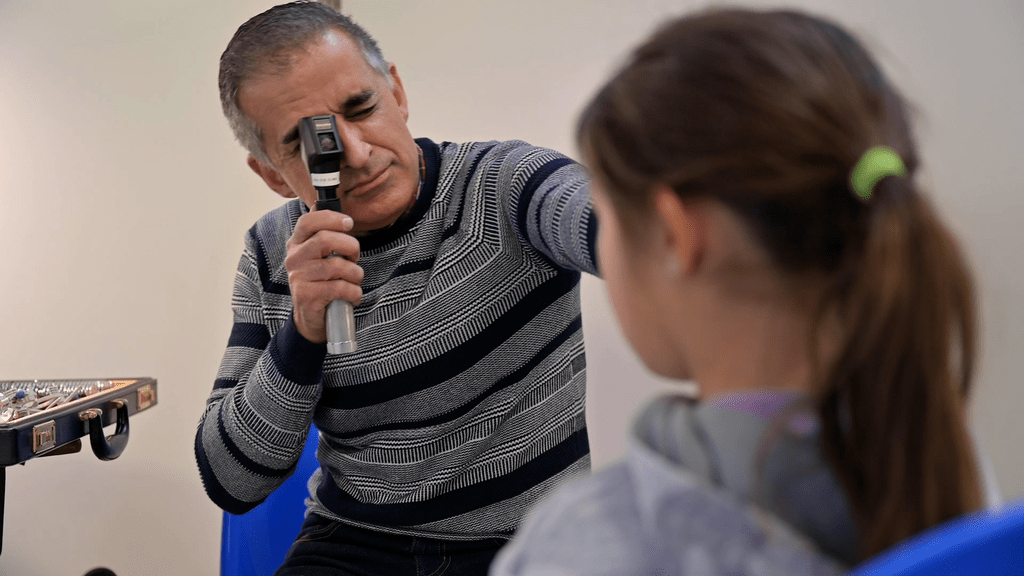
HHS physician instrumental in bringing virtual eye exams to Indigenous children
Thousands of Indigenous children living in remote northern Ontario communities now have access to virtual eye exams thanks to an innovative partnership between their community leaders, the Weeneebayko Health Authority (WAHA), a Hamilton Health Sciences (HHS) physician and software developers from McMaster University.
The new Indigenous Children Eye Examination (ICEE) program makes it possible for children from Weenusk, Fort Albany, Kashechewan, Attawapiskat, Moose Cree and MoCreebec Eeyoud First Nations, and the Town of Moosonee, to have their eyes examined on a regular basis, receive glasses if needed and catch eye conditions requiring follow-up — all through remote link-ups with eye care professionals at HHS’ McMaster Children’s Hospital (MCH).
Dr. Kourosh Sabri, a pediatric ophthalmologist with MCH, came up with the concept of delivering eye care to children in these Hudson and James Bay areas after visiting Indigenous communities by plane over the past five years.
“I can do about 20 eye exams in a visit,” says Sabri. “But given that there are over 6,000 Indigenous children living in these areas, 20 exams isn’t even a drop in the ocean. It’s a molecule.”
Program developed through innovation, determination and partnership
While in-person visits by Sabri and his team will always be part of the ICEE program, the COVID-19 pandemic created a seemingly unsurmountable obstacle to delivering eye care to these children. However, through innovation, determination and partnership, the ICEE program has developed the means to deliver regular eye care remotely, even in the middle of a pandemic.
“With this technology we can connect with any child, anywhere in the world.”
Good vision is vital to a child’s healthy development and success in school, says Sabri. Yet only 15 to 16 per cent of Canadian children under the age of six have had an eye exam. And for Indigenous children in isolated communities it’s especially challenging. Prior to the ICEE program, the closest place for children from these seven northern communities to receive an in-person eye exam was Timmins – a one hour trip by plane.
Strong, sustainable partnerships
Strong, sustainable partnerships between the Indigenous communities and MCH made this virtual screening program possible, says Sabri, adding that nurses, paramedics and other health care staff from these communities will be trained to give eye exams, and prescribe and fix glasses. ICEE technology developed by McMaster will link the health care staff and children with eye specialists at MCH through a website that houses the innovative new eye exam software and includes virtual exam rooms.
“We want all children to receive good care, regardless of where they live.”
The $1.7 million in funding for the ICEE program came from Indigenous Services Canada through Jordan’s Principle, which helps ensure First Nations children have the same access to public services as other children in Canada. If the ICEE program proves successful, it could become the platform for delivering eye care to other remote communities nationally and internationally.

Dr. Kourosh Sabri performs a refraction exam on a child in Moosonee. Photo courtesy of McMaster University.
“With this technology we can connect with any child, anywhere in the world,” says Sabri, adding that Canada needs a national, universal vision screening program for children. “We want all children to receive good care, regardless of where they live.”
“We have the technology to screen children remotely and catch any issues early, so children are set up to succeed.”
Sabri was also instrumental in bringing the EYE MAC program to Hamilton schools five years ago. This not-for-profit, mobile eye screening program brings together eye care professionals, school boards and McMaster student volunteers to deliver eye exams to all senior kindergarten children in the city’s public, Catholic and French schools. University students are trained to perform eye tests, and children with reduced vision are referred to a local optometrists.
“Our EYE MAC program examines between 5,000 and 6,000 Hamilton children each year,” says Sabri. “We are the public health agent in Hamilton for vision screening.”
This school year, due to COVID-19, Sabri hopes to bring virtual vision screening to Hamilton schools, where volunteer vision screeners would connect remotely with children in the classroom or at home doing online learning. This will be the first of its kind, remote, mass vision screening of children ever done in Canada.
“It’s the same concept as the ICEE program,” says Sabri. “It really doesn’t matter if the child lives in James Bay or Stoney Creek. We have the technology to screen children remotely and catch any issues early, so children are set up to succeed.”
Visit the ICEE website for more program information.
